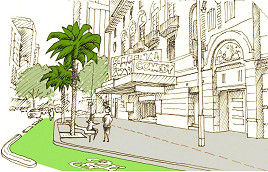Glad to be back
By Rhonda Dredge
Juries could be reintroduced at the Supreme Court at the end of October and even though there is no news yet about the County Court, barristers are taking heart.
With a back log of more than 1700 cases waiting to be heard at the County Court there will be plenty of work ahead.
Until then however, lawyers agree that it has been a really difficult time for those working in crime.
“I don’t have a full practice,” barrister John Moore said of the Melbourne Bar, but at least he’s back occasionally in the CBD, including on Vaxxed Melbourne Day where he worked in the office.
John has spent more time with his children than he has at the bar during the pandemic, learning how to balance home and work life and picking up a few new skills on Zoom and Webex.
He feels smaller with a lower horizon but he can still ham it up for the camera, having learnt how to use his hands and facial expressions over the lockdown.
He says there is less solemnity with online performances and they call for a different skill set.
“A lot of people say there’s a lot to be said for assessing the demeanor and body language of a person,” he said. “It’s harder on a screen.”
He says that work becomes a performative act on screen for the camera. “Your presentation is head and shoulders. You have to be more compelling.”
Barristers have been offered training by NIDA Corporate and it is possible to cross examine and make points of order with some trials using a mix of court and online but there can be mishaps.
A couple of months back a party to a case on Zoom forgot to turn off his mike and called someone “a f…ing idiot”, which was broadcast in court.
John is not alone in having to adjust to justice at a distance. There have been few barristers in the CBD’s legal district during this long, lean period of isolation.
“When people say that it has been bad that’s because there’ve been no jury trials,” John explained. “That has a knock-on effect. It shrinks the pool [of work] dramatically. I don’t know anyone who’s been decimated. It’s an overall reduction.”
The father of two was in town on Vaxxed Melbourne Day catching up with a mate at Patricia’s, a coffee house at the back of the Supreme Court, after a stint in his Lonsdale St office.
“I’ve missed socialising,” he said, trying to put the experience of lockdown into perspective.
“Psychologically, our horizons have been reduced by being at home all the time. We’ve been fatigued by small hassles that add up to a big impact.”
He said the big lockdown last year was the most difficult. Like many in his profession, John was on JobKeeper and looking after his kids, both under five, with no child care available.
“There was a time in 2020 when it was very lean,” he said. “It’s not as lean now because the courts have online up and running.”
During the second major lockdown, he has been coming sometimes into the office as an authorised worker and his kids have been entitled to go into day care.
But most of the work hasn’t been on trials. “I do other stuff, not trials. I’m working at about two thirds,” he said.
There have been some compensations, mostly for defendants waiting for trials, in that they’ve received lighter sentences for pleading guilty.
“There is a heightened public benefit of a case being resolved,” John said. The Court of Appeal ruled in the Woyboyes decision that “the discount for pleading guilty in COVID times should be elevated.” •

Council endorses office tower at Flinders Lane despite querying car park demolition





 Download the Latest Edition
Download the Latest Edition